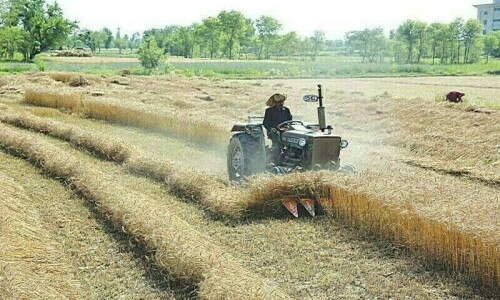On the eve of his first meeting with Russian President Vladimir Putin, President Donald Trump questioned the veracity of American intelligence about foreign meddling in the 2016 US election, arguing Thursday that Russia was not the only country that may have interfered.
“Nobody really knows for sure,” Trump said.
He made the comments during a joint news conference with Polish President Andrzej Duda in Warsaw as he opened his second visit to Europe. He will also visit Germany to attend the Group of 20 economic summit, where he'll meet with Putin.
As US investigations into Russia's meddling forge ahead, Trump is under intense scrutiny for how he handles his first meeting with the Russian supremo. US intelligence officials say the unpredictable Russia leader ordered interference into the 2016 election that brought Trump to the White House.
Loathe to cast a shadow on his election victory, Trump has firmly avoided blaming Moscow for campaign hacking in the past, and on Thursday, he was similarly elusive. He argued variably that it could have been Russia, probably was Russia and indeed was Russia, while insisting it could have been other countries, too.
“I won't be specific. A lot of people interfere. It's been happening for a long time,” Trump said in Poland.
When asked whether he planned to discuss the issue with Putin, Trump demurred.
The president sought to redirect scrutiny toward his predecessor, Barack Obama, accusing him of allowing Moscow to meddle on his watch. Though the Obama administration warned Russia publicly and privately before Election Day to stop interfering, it is doubted whether it took sufficient action.
“They say he choked. Well, I don't think he choked,” Trump said. “I think he thought Hillary Clinton was going to win the election, and he said, 'Let's not do anything about it.'”
Using information collected by the FBI, CIA and the National Security Agency, the US national intelligence director last year concluded that Moscow was behind the hack of Democratic Party email systems and attempted to influence the 2016 election to benefit Trump. The Obama administration said the effort was directed from the “highest levels” of Russia's government.
Trump said the CIA had informed Obama about the hacking months before the election but added that “mistakes have been made.”
Though Trump has made similar statements before, it was an extraordinary public expression of doubt about US intelligence capabilities by a president while standing on foreign soil.
Opening his second overseas trip as president, Trump also warned North Korea that he's considering “some pretty severe things” in response to the isolated nation's unprecedented launch of a missile capable of reaching the US. Though he declined to offer specifics on the US response, Trump called on all nations to confront the North Korea’s “very, very bad behaviour.”
In his first public comments since North Korea’s intercontinental ballistic missile (ICBM) test this week, Trump called the country a “threat”. However, he declined to offer specifics about what a US response might entail, stating that US will “confront it very strongly”.
“It's a shame that they're behaving this way,” Trump said of North Korea's leaders. “But they are behaving in a very, very dangerous manner, and something will have to be done about it.”
Trump said it wasn't certain he'd follow through on the severe steps he was weighing, adding that he does “not draw red lines.”
The US has been considering a range of possible sanctions, economic measures and other steps to confront Pyongyang. The test of an ICBM marked a major technological advancement for North Korea. US officials say it brings the North closer to being able to mount a nuclear warhead atop a missile that could hit American soil.
Trump also attacked several US news organisations for their coverage of his presidency, eliciting sympathy from Duda, who suggested that he too, was covered unfairly.
“We don't want fake news,” Trump said.
Standing alongside the visiting American, Duda said he hoped Poland would soon sign a long-term contract for US liquefied gas deliveries that will help it cut dependence on Russian oil and gas, which Moscow has previously used as a tool to exert political pressure. Poland received its first US delivery last month, a one-time deal that it hopes to make permanent.
Drawing an implicit contrast with Russia, Trump pledged that the US would never use energy to coerce eastern and central European nations. He vowed that it wouldn't allow other nations to coerce them, either.
Later on Thursday, Trump planned to deliver a speech from Krasinski Square, the site of a monument commemorating the 1944 Warsaw Uprising against Nazi occupation. Crowds waving US and Polish flags gathered ahead of his speech in and around the square, where TV screens were erected to allow more people to see Trump.
Yet the visit drew some criticism from Poland's Jewish community, which said it regretted Trump was skipping the traditional presidential visit to a memorial honouring those who fought and died in the Warsaw Ghetto Uprising.
Trump started his day at the Royal Castle, welcomed by Duda with a vigorous handshake in front of a white marble bust of Stanislaw August Poniatowski, the last king of Poland.
Joking later with leaders at a summit of eastern and central European nations, Trump boasted of a thriving US economy but lamented his exclusion from recent stock market gains.
“Personally, I've picked up nothing,” he said.















































